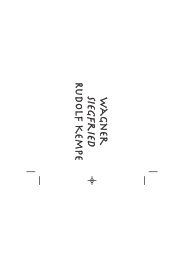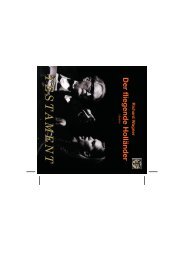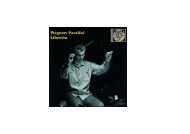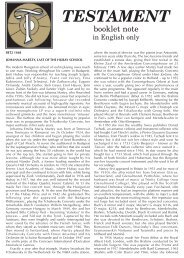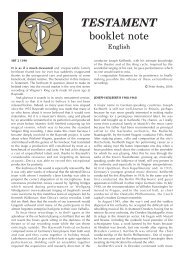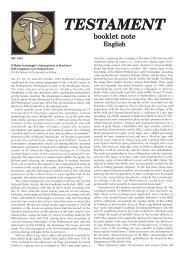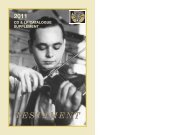TESTAMENT
TESTAMENT
TESTAMENT
Create successful ePaper yourself
Turn your PDF publications into a flip-book with our unique Google optimized e-Paper software.
oadcasting frequently for Italian Radio.<br />
Still she had not been taken up by the leading opera<br />
houses outside of Italy, but John Christie, founder of<br />
Glyndebourne Opera, must have heard her and been<br />
impressed, booking her to be his Lady Macbeth in 1939<br />
under Fritz Busch. As Michael Bott notes: “Few sopranos<br />
have the vocal armoury to tackle the enormous difficulties<br />
of Lady Macbeth, a role which demands tremendous vocal<br />
agility and ranges from a low B to the pianissimo D flat of<br />
the famous sleepwalking scene… with substantial vocal<br />
athletics including powerful chest tones, trills in all<br />
registers and two octave runs.”<br />
It was this role that established Grandi’s reputation<br />
internationally. Astonishingly, Verdi’s Macbeth had not<br />
been performed prior to 1938 in England – but these ten<br />
performances were a revelation and a triumph for Grandi.<br />
“Anyone who heard Margherita Grandi sing [“Vieni,<br />
t’affretta”] at Glyndebourne or Edinburgh knows that it<br />
can, with its cabaletta... produce an effect of tigerish<br />
ferocity, and it is not unreasonable to assume that this is<br />
what Verdi had in mind and could obtain in his own day,”<br />
wrote Lord Harewood in his new edition of Kobbé in<br />
1954. The Sunday Times noted that “she is magnificently<br />
voiced; it was thrilling to hear those notes… rolling out<br />
with such power and freedom”, and The Observer<br />
commented that she was “the prima donna that appears<br />
only in the dreams of conductor and producer”.<br />
In more normal times, she would have gone on to<br />
become a great international star but the Second World<br />
War loomed. Initially she was sent to a camp at Avellino,<br />
near Naples, but her husband retrieved her and she<br />
retreated to the Italian Alps near Bergamo for the duration,<br />
only emerging occasionally, most notably taking the lead<br />
role in the Italian première of Richard Strauss’s Friedenstag<br />
in Venice in January 1940, and as Ottavia in Monteverdi’s<br />
L’incoronazione di Poppea in Rome in April 1943 under<br />
Serafin. In the mountains she is said to have actively<br />
supported the partisans, helping to smuggle Allied airmen<br />
to safety in Switzerland.<br />
This enforced break was particularly disastrous for her.<br />
In 1939 she was still in her prime at 47 years old, but by<br />
the end of the war she was already 53 (late for a dramatic<br />
soprano) and would soon begin to decline vocally.<br />
However, she did pick up her career again in 1945, reemerging<br />
in Verdi’s Requiem under Serafin at the Teatro<br />
Lirico (the temporary home of La Scala) in Milan in June,<br />
then in La Gioconda (with Stignani and Gigli) in July 1946<br />
in Rome, opening Verona Festival’s first post-war season in<br />
August in Aida.<br />
Quite soon she came back to Britain, the scene of her<br />
pre-war triumph as Lady Macbeth, repeating that success<br />
with Glyndebourne Opera when they opened the first<br />
Edinburgh Festival in 1947. There were nine performances<br />
of Macbeth between 25 August and 13 September, and it<br />
was the broadcast of that production on 27 August that<br />
<strong>TESTAMENT</strong><br />
booklet note<br />
English<br />
forms the largest part of this new CD. After Edinburgh, she<br />
sang Senta in a BBC broadcast of Wagner’s The Flying<br />
Dutchman, then returned to Italy, giving Verdi’s Requiem<br />
again under Serafin, this time at the Palazzo Ducale in<br />
Genoa.<br />
She also sang with the highly-regarded New London<br />
Opera Company at the Stoll and Cambridge Theatres in<br />
London between 1946 and 1949 (Donna Anna in Don<br />
Giovanni and Tosca), her husband Giovanni with her as<br />
director and designer. In the latter year she returned to the<br />
Edinburgh Festival with Glyndebourne Opera as Amelia in<br />
Un ballo in maschera under Gui, a role she shared with<br />
Ljuba Welitsch.<br />
She also finally made her Covent Garden début in<br />
September, creating the role of Diana in Bliss’s The<br />
Olympians. There, soon after, she gave five performances<br />
of Il trovatore, and her stage career ended at Covent<br />
Garden on 27 November 1951 as Tosca. Her husband,<br />
Giovanni, retired as director of scenic design at La Scala<br />
two years later. Margherita Grandi died in Milan in 1972.<br />
Considering her stature, Grandi made a pitifully small<br />
number of commercial recordings – her most famous<br />
scenes as Lady Macbeth, recorded in 1947 and 1948 with<br />
the Royal Philharmonic Orchestra under Beecham,<br />
Elisabetta’s aria from Don Carlo (also with the RPO, under<br />
Erede), and “Pace, pace” from La forza del destino<br />
(unfortunately destroyed) – these all for HMV. For Decca,<br />
she recorded under Beecham the role of Giulietta in his<br />
complete Tales of Hoffmann, the soundtrack to Michael<br />
Powell and Emeric Pressburger’s 1947 film (which starred<br />
Robert Helpmann, Moira Shearer and Frederick Ashton).<br />
All her other surviving performances are from late in<br />
her career, derived from radio broadcasts and rare ‘private<br />
recordings’ – perhaps there are more still to be discovered?<br />
For years collectors and connoisseurs have sought out<br />
individual recordings by Margherita Grandi. Here, for the<br />
first time, is a whole CD devoted to her ravishing artistry –<br />
a unique opportunity for a new generation of singers and<br />
opera-lovers to discover her.<br />
Roger Neill, 2006



